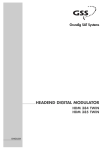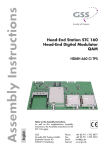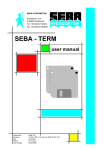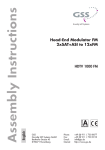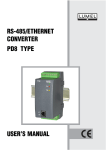Download Grundig Flat Panel Television PHDQ 2002 BC User's Manual
Transcript
HDTV Digital QAM KLASSE PHDQ 2002 BC PHDQ 3002 BC PHDQ 4002 BC PHDQ 5002 BC A CLASS CLASS English Assembly Instructions Grundig SAT SystEms GSS Grundig SAT Systems GmbH Beuthener Straße 43 D-90471 Nuremberg Phone: Fax: Email: Internet: +49 (0) 911 / 703 8877 +49 (0) 911 / 703 9210 [email protected] http://www.gss.tv Contents 1 Safety regulations ............................................................................................... 3 2 General information ............................................................................................ 3 2.1 Packing contents .................................................................................... 3 2.2 Technical data ....................................................................................... 4 2.3 Description ........................................................................................... 5 2.3.1 Manual display of the software version.......................................... 6 2.3.2 How the TP module works ............................................................ 6 2.3.3 Explanation of the term “symbol rate” ............................................ 7 3 Assembly ............................................................................................................ 8 3.1 Installing the Cassette ............................................................................. 8 3.2 Connecting the Cassette ......................................................................... 8 4 The operator control panel at a glance ................................................................. 9 4.1 Menu items ........................................................................................... 9 4.2 Operator control panel........................................................................... 9 5 Programming .................................................................................................... 10 5.1 Preparation ..........................................................................................10 5.2 The menus at a glance ..........................................................................11 5.2.1 The menu of channel strip B.........................................................12 5.3 Cassette programming ..........................................................................13 Selecting the Cassette ...........................................................................13 Switching the channel strip.....................................................................13 To query software versions: ...................................................................14 Setting the output channel (only Bx…A) ...................................................14 Modulator settings (only Bx…A) .............................................................16 Setting output level of the channel strips (only Bx…A) ................................16 Producing a QAM signal for testing (only Bx…A) .....................................17 Inverting the user signal (only Bx…A) ......................................................17 QAM monitoring (only Bx…A) ...............................................................18 Setting the LNB oscillator frequency ........................................................18 Setting the input symbol rate and the DVB mode ......................................19 Setting the input frequency (transponder frequency) ................................. 20 Setting the QAM modulation value (only Bx…A) ......................................21 Setting the stuffing (only Bx…A)............................................................. 22 Saving settings .................................................................................... 23 -2- 1 Safety regulations Important • Assembly, installation and servicing must be carried out by an authorised electrician. • Switch off operating voltage before the start of assembly or service work or pull out the mains plug. • Install the system … in a dust-free, dry environment so that it is protected from moisture, vapours, splashing water and damp somewhere protected from direct sunlight away from the immediate vicinity of heat sources at an ambient temperature of < 50 °C. • Make sure the device is adequately ventilated. Do not cover the ventilation slots. • Beware of short circuits! • No liability is accepted for damage caused by faulty connection or inexpert handling. • Observe the relevant norms, regulations and guidelines on the installation and operation of antenna systems. • Earth the SAT receiver using the equipotential bonding rail in accordance with DIN EN 50083 and VDE 0855. • Do not perform installation and service work during thunderstorms. Take action to prevent static discharge when working on the device. 2 General information 2.1 Packing contents 1 Cassette PHDQ 2002 BC or PHDQ 3002 BC or PHDQ 4002 BC or PHDQ 5002 BC 2 HF connection cables 1 Assembly instructions (on CD) 1 Measuring log -3- 2.2 Technical data The devices meet the following EU directives: 73/23/EEC, 89/336/EEC The product fulfils the guidelines and standards for CE labelling. HF input: Frequency range: Frequency raster: Level range: DVB-S modes: DVB-S2 modes: Symbol rate DVB-S: Symbol rate DVB-S2: HF output: PHDQ 2002 BC Frequency range: 950 … 2150 MHz 1 MHz 35 dBµV … 80 dBµV DVB-S 1/2 , 2/3 , 3/4 , 5/6 , 7/8 QPSK 1/2 , 3/5 , 2/3 , 3/4 , 4/5 , 5/6 , 8/9 , 9/10 , 8PSK 3/5 , 2/3 , 3/4 , 5/6 , 8/9 , 9/10 QPSK: 2 … 45 MSymb/s QPSK: 10 … 30 MSymb/s 8PSK: 10 … 31 MSymb/s 60 MHz … 86 MHz PHDQ 3002 BC Frequency range: 112 MHz … 306 MHz PHDQ 4002 BC Channels: Frequency range: Channel raster: S21 … S41 306 MHz … 466 MHz 8 MHz PHDQ 5002 BC Channels: Frequency range: Channel raster: C21 … C69 474 MHz … 858 MHz 8 MHz Output level: Output impedance: Typ. 90 dBµV 75 Ω, nominal -4- Connections: SAT inputs: HF output: Connection strip (10-pin): Socket RS 232: 2 F-connectors 1 IEC socket, female For supply voltages and control circuits Update interface 2.3 Description The Cassettes convert two QPSK-modulated data flows into one QAM-modulated data flow. The Cassettes are controlled via the head end. Each Cassette has two inputs and one HF output, as well as an integrated multi-transport flow processor for stuffing, PID pass, drop and service filtering. For these Cassettes, information from a barker channel can be added or exchanged with a transport flow (MTP function, Drop- and service filter). For this purpose, there are two autonomous reception tuners and one modulator on which the modified transport flow can be transmitted as a QAM-modulated signal. The SDT and PAT tables are automatically generated. All data relevant to the operation of the Cassette is registered in a logbook with a maximum of 500 entries. The operating software of the Cassette can be actualised via an external 9-pin SUB-D-socket, using a PC or notebook, (software “BE-Flash”) or settings in the channel strips “A” (service channel) and “B” (barker channel) of the Cassette (PC software “MTP”, component of software PSW 1000). You can find the current operating software of the Cassettes on the website “http://www.gss.tv”. The prepared input signals are transmitted to the HF output collector of the head end via the HF output socket. The output level of the Cassettes can be set with the level regulator (max. –20 dB) at the output collector of the head end. After the head end has been switched on, the software version of the control unit is displayed briefly in the two-line LC display and afterwards the type of Cassette of the first slot. Approximately five minutes after the last button has been pressed, the software version of the control unit is displayed. The Cassettes are designed for use in the following head ends: – PSU 12 – PSU 8 – PGT 8 -5- 2.3.1 Manual display of the software version If necessary, you can call up the display of the software version of the control unit manually: • Hold down any two keys of the control unit simultaneously until the display goes dark and the software version, e.g. “V.34”, is displayed. 2.3.2 How the TP module works When converting the QPSK-modulated signal to a QAM-modulated cable signal, the demodulated data stream can be accessed via the integrated TP module. This data stream, also called transport stream, contains several stations with all their components (video, audio, data and service information), which can be changed using the TP module. The individual functions Station filter Individual stations can be deleted. This reduces the data rate and, consequently, the output symbol rate. Stuffing The transport stream is padded out using what is known as zero data. This increases the data rate and, consequently, the output symbol rate. Changing the output symbol rate suitably alters the bandwidth used (halving the output symbol rate roughly halves the bandwidth at the output). Changing service information The transport stream contains data in the form of tables which the receivers evaluate and require for convenient use. The TP module can change the “Network Information Table” (NIT). The NIT contains data which the set-top box needs for the automatic search function. -6- 2.3.3 Explanation of the term “symbol rate” High-quality modulation methods like QPSK and QAM can encrypt several bits as a single transferred and received symbol. The user data stream contains the audio and video signals of a station and is thus permanently assigned. If the value of the modulation and therefore the number of bits per symbol is increased, the symbol rate falls compared to the user bit rate. Formulae for calculating the output symbol rate “SR (A)” at a fixed input symbol rate “SR (E)” and “FEC”. 256-QAM: 128-QAM: 64-QAM: 32-QAM: 16-QAM: 4-QAM: SR (A) = FEC x 1/4 x SR (E) SR (A) = FEC x 2/7 x SR (E) SR (A) = FEC x 1/3 x SR (E) SR (A) = FEC x 2/5 x SR (E) SR (A) = FEC x 1/2 x SR (E) SR (A) = FEC x 1/1 x SR (E) Example: Output symbol rate 64-QAM, FEC= 3/4, Input symbol rate SR (E) = 27,500 kilosymbols per second SR (A) = 3/4 x 1/3 x 27,500 kilosymbols/s SR (A) = 6,875 kilosymbols/s Note: If no “FEC” is stated in the station lists, it can be assumed to be “FEC = 3/4”. Reception from a transponder with a very low symbol rate (SCPC station) The extremely low data rate means that the output symbol rate is very low. If there are reception problems with different digital receivers, set QAM modulation with stuffing to a higher value. Defined symbol rates Some cable operators specify a fixed symbol rate (e.g. 6,900 kilosymbols per second). -7- 3 Assembly 3.1 Installing the Cassette Warning Before inserting or changing Cassettes, pull the mains plug of the head end out of the mains socket. • Unscrew the fastening screws from the bracket in the head end. • Insert the Cassette into a free slot and push it into the housing. • Align the Cassette and gently make it contact with the connections of the circuit board and the HF bus bar. • Fasten the Cassette with the 1 screws. C101 L104 L100 L101 L103 C100 CASSETTE CASSETTE CASSETTE CASSETTE CASSETTE CASSETTE CASSETTE CASSETTE CASSETTE CASSETTE CASSETTE CASSETTE BREITBA LNC+18V +24 ROT GRUEN +18V Anschl. INPUT OUTPUT OUTPUT INPUT 3.2 Connecting the Cassette • Connect the HF input cable with the input sockets “INPUT A” (channel strip A) and “INPUT B” 1 (channel strip B). • Connect the head end to the mains power supply. —> The Cassette is now ready for operation. 2 *1/Ê *1/Ê ,-ÓÎÓ -8- Note: The operating software of the Cassette can be updated via the socket “RS 232” 3 (9-Pin-Sub-D) by means of a PC or notebook. Use the “BE-Flash” software as the update software. You can make drop and pass filter settings in the channel strip “B” using the “MTP” PC software. You can find the current operating software of the Cassettes on the website “http://www.gss.tv”. 4 The operator control panel at a glance 4.1 Menu items Program the Cassette using the keys on the head end control unit. The two-line display of the control unit then shows the menus. You can select the following main menu items with the button: BE–Remote V. 34 PROFESSIONAL – – – – – – – Cassette and channel strip Output channel LNB oscillator frequency Symbol rate Input frequency QAM modulation Stuffing 4.2 Operator control panel You can individually select the menus and menu items step-by-step using the key pad of the head end: scrolls forward through the menu AUDIO scrolls backward through the menu ◀/▶ select parameters in the menus set values, initiate actions selects sub-menus M saves all entries The parameters to be set are displayed underlined (cursor). -9- 5 Programming The following examples show how the PHDQ 4002 BC Cassette is programmed; the output channels can be set from S21 … S41. Set the other Cassettes listed in the same way. 5.1 Preparation Notes: Using the menu “LEVEL CONTROL” the Cassette generates an equally powerful HF carrier on the video carrier frequency of the channel. In this way, the Cassette‘s level can also be set with an analogue TV test receiver set to the video carrier frequency of the channel. In order to prevent interference within the head end and the cable system, the output level of the digital Cassettes must be lowered by approx. 10 dB at 64 QAM and by approx. 4 dB at 256 QAM compared to analogue Cassettes. - 10 - L100 L101 L103 C100 CASSETTE 1 CASSETTE LNCBREITBA +18V +24 ROT GRUEN +18V Anschl. CASSETTE • Connect the test receiver to the “TEST OUTPUT” 1 of the head end. • Set the output channel of the Cassette (see page 14) and adjust the TV test receiver to this channel. • Switch on the modulator if necessary. • Measure the output level of the analogue Cassettes and, if necessary, tune them to a uniform output level. • Check the output level of the digital DVB-MTP Cassettes. Lower the output level of the appropriate Cassette in relation to the analogue Cassettes at 64 QAM by approx. 10 dB and at 256 QAM by approx. 4 dB with the level adjuster to the right of the Cassette. • After programming the Cassette check the output level of the Cassette again and if necessary set it again. . 5.2 The menus at a glance BE–Remote Ein/On Mit * ) gekennzeichnete Funktionen sind nur im Kanalzug ”A“ möglich Functions marked by a star * ) are only possible in the channel strip ”A“ V.34 PROFESSIONAL t > 10 s Box 1 S21-S41 DVB-MTP *** S21 Bx 1A TWIN-SAT Böx 4 TWIN-SAT Box 2 TWIN-QAM C5-12,S3-24 C07 C5-12,S3-24 C07 *** S23 S21-S41 + Bx 1A Kanalzug Channel strip S21-S41 DVB-MTP Bx 1A *** S21 VERSION: PHDQ 4002 V3 A/B Bx 1A VERSION: TP-Modul: Bx 1A S21 OUTPUT: (306.00) ! t>2s*) ▶ Bx 1A OUTPUT: S21 ▶ *) MTP15 0 (306.00) -64 … +64 ! *) OUTPUT: Bx 1A Modulator: *) on / off OUTPUT: Bx 1A LEVEL *) on HF OUT: 0 0 … -7 OUTPUT: Bx 1A LEVEL CONTROL *) *) Bx 1A OUTPUT: RANDOM 6900 kBd Bx 1A OUTPUT: Spectrum *) normal normal / inverse MODE: Bx 1A Ueberwachung - 11 - Überwachung / KDG Monitoring Bx 1A LNB-Freq.: ◀/▶ f = 10600 MHz ◀/▶ / + – Bx 1A INPUT: ◀/▶ 27500 DVB-S + Bx 1A INPUT: f=11836 / – C/N Bx 1A 14.6 dB -0.4 *) (+ 9.6)OK Kanalzug B M Channel strip B *) Bx 1A QAM-MODE: *) Bx 1A / + 256-QAM STUFFING: ◀/▶ / + SR=6900 (6531) – – Kanalzug A M Channel strip A 5.2.1 The menu of channel strip B + Bx 1A Kanalzug Channel strip S21-S41 DVB-MTP *** S21 A/B Bx 1B LNB-Freq.: ◀/▶ f = 10600 MHz ◀/▶ + / – Bx 1B INPUT: ◀/▶ 27500 DVB-S + Bx 1B INPUT: f=11836 / – Bx 1B 14.6 dB -0.4 M - 12 - C/N (+ 9.6)OK 5.3 Cassette programming • Switch on the head end. —> The display shows the software version of the head end (e.g. V.34). —> The processor reads the Cassettes‘ data (approx. 10 s). Ein/On BE–Remote Mit * ) gekennzeichnete Funktionen sind nur im Kanalzug ”A“ möglich Functions marked by a star * ) are only possible in the channel strip ”A“ V.34 PROFESSIONAL t > 10 s Box 1 S21-S41 DVB-MTP *** S21 Bx 1A TWIN-SAT Böx 4 TWIN-SAT Box 2 TWIN-QAM C5-12,S3-24 C07 C5-12,S3-24 C07 *** S23 S21-S41 + Selecting the Cassette • If necessary select the Cassette you want to program . (Box…) by repeatedly pressing the button • By pressing , activate channel strip “A”. Switching the channel strip —> The display shows e.g. the menu “Bx 1A DVB-MTP”. “Bx“ Cassette (box) “1” Cassette 1 ”A” Channel strip A ”S21-S41” Adjustable channel range ”***” Functions of the MTP module ”S21” Set channel Bx 1A Kanalzug Channel strip S21-S41 DVB-MTP Bx 1A *** S21 VERSION: PHDQ 4002 V3 A/B Bx 1A TP-Modul: VERSION: MTP15 • Select the desired channel strip “A” or “B” with - 13 - . To query software versions: - Software version and type of the Cassette: button once. Press the Software version of the TP module: Press the button twice. Return to main menu: Press the button again. • Press the button. —> The “OUTPUT” menu is activated. Setting the output channel (only Bx…A) Bx 1A S21 OUTPUT: (306.00) ! t>2s*) ▶ ▶ *) Bx 1A S21 OUTPUT: 0 (306.00) -64 … +64 ! • By pressing , set the desired output channel. —> The channel range that can be set depends on the type of Cassette used. Frequency offset (fine tuning) • Press and hold down the ▶ button until “0” also appears in the display. • Use the keys to set the offset (-64 … +64). • If necessary, use the ◀ / key to return to the channel setting. Note: Using the Cassette PHDQ 2002 BC and PHDQ 3002 BC the menu “Frequency setting” appears instead of “Channel setting”. - 14 - ◀/▶ + / – Bx 1A OUTPUT: Bx 1A OUTPUT: Modulator: 112.0000 MHz on C C C C C C C C C C C C C C 28 29 30 31 32 33 34 35 36 37 38 39 40 41 - 15 - 530.00 538.00 546.00 554.00 562.00 570.00 578.00 586.00 594.00 602.00 610.00 618.00 626.00 634.00 C C C C C C C C C C C C C C 42 43 44 45 46 47 48 49 50 51 52 53 54 55 642.00 650.00 658.00 666.00 674.00 682.00 690.00 698.00 706.00 714.00 722.00 730.00 738.00 746.00 C C C C C C C C C C C C C C 56 57 58 59 60 61 62 63 64 65 66 67 68 69 Channel centre frequency [MHz] Channel Channel centre frequency [MHz] 418.00 426.00 434.00 442.00 450.00 458.00 466.00 474.00 482.00 490.00 498.00 506.00 514.00 522.00 Channel S 35 S 36 S 37 S 38 S 39 S 40 S 41 C 21 C 22 C 23 C 24 C 25 C 26 C 27 Channel centre frequency [MHz] 306.00 314.00 322.00 330.00 338.00 346.00 354.00 362.00 370.00 378.00 386.00 394.00 402.00 410.00 Channel Channel centre frequency [MHz] 21 22 23 24 25 26 27 28 29 30 31 32 33 34 Channel S S S S S S S S S S S S S S Channel centre frequency [MHz] Channel The QAM signal is transmitted with a bandwidth of 8 MHz. This means that you can only use the channel centre frequency of the existing channel raster in the range of channels S21 … C69 (frequency raster 8 MHz). The frequency raster is 7 MHz in the range of the lower channel ranges (≤ channel S20). If one uses the existing channel raster here, this will result in interference (overlapping) of the 8 MHz QAM signal packages and thus transmission problems. For programming in this channel range, we recommend to calculate the output frequency of the QAM modulator, … starting with the upper output frequency of the Cassette listed in the “Specifications” going back in steps of 8 MHz, or … starting with the lower output frequency of the Cassette listed in the “Specifications” moving up in steps of 8 MHz. 754.00 762.00 770.00 778.00 786.00 794.00 802.00 810.00 818.00 826.00 834.00 842.00 850.00 858.00 Press the button. —> The menu “Setting the LNB oscillator frequency” – “LNB-Freq.:” is activated (page 18). or button. • Press the —> The sub menu “Modulator settings” – “OUTPUT: Modulator” is activated. Modulator settings (only Bx…A) *) OUTPUT: Bx 1A Modulator: on on / off buttons, switch the modulator • By pressing the (HF output) “on” (default setting). • Press the button. —> The display shows “OUTPUT: LEVEL HF OUT:”. Setting output level of the channel strips (only Bx…A) *) Bx 1A LEVEL *) Bx 1A OUTPUT: HF OUT: 0 0 … -7 OUTPUT: LEVEL CONTROL • Press the button. —> “OUTPUT: LEVEL CONTROL” appears in the display. Note: In this mode a digital carrier is set to the analogue picture carrier frequency of the output channel of the channel - 16 - strip. Thus you can measure the absolute output level using a analogue test receiver. • Measure the output level of the channel strip using the connected antenna test receiver. • By pressing the AUDIO button activate the menu “OUTPUT: LEVEL HF OUT:” and adjust the output level incrementally from “0” to “–7” dB by pressing . • Press the —> “OUTPUT: button twice. RANDOM” is shown in the display. Producing a QAM signal for testing (only Bx…A) *) Bx 1A OUTPUT: RANDOM 6900 kBd The Cassette generates a QAM signal for testing, without there having to be an input signal. In the second menu line, the corresponding output symbol rate e.g. “6900 kBd” (= 6,900 kilosymbols per second) is shown. • Press the button. —> The display shows the “OUTPUT: Spectrum” menu. Inverting the user signal (only Bx…A) For exceptions and “older” digital cable receivers, the spectral position of the user signal can be inverted. *) Bx 1A Spectrum - 17 - OUTPUT: normal normal / inverse • By pressing “inverse”. set the spectral position “normal” or • Press the button. —> The menu “QAM monitoring” – “MODE: Ueberwachung” is activated. QAM monitoring (only Bx…A) In this menu the signal at the Cassettes´ output is defined if there is no input signal available: – “Ueberwachung” (Monitoring): Single carrier, – “KDG”: QAM modulated data flow. Thus an automatic monitoring of the QAM modulated output signal is possible. *) MODE: Bx 1A Ueberwachung • Use Überwachung / Monitoring to select “Ueberwachung” or “KDG”. • Press the button: —> The menu “Setting the LNB oscillator frequency” – “LNB-Freq.:” is activated. Setting the LNB oscillator frequency Bx 1A LNB-Freq.: ◀/▶ f = 10600 MHz • Use the ◀ / ▶ buttons to place the cursor under the number to be changed and use to set the LNB oscillator frequency. • Press the button: —> The menu “Setting the input symbol rate and the DVB mode” – “INPUT SR=27500” is activated. - 18 - Setting the input symbol rate and the DVB mode Setting the symbol rate The symbol rate “SR” of the satellite transponder can be found in the current transponder tables of the various satellite trade magazines or in the websites of the according program providers. Bx 1A INPUT: ◀/▶ 27500 DVB-S + / – • Use the ◀ / ▶ buttons to place the cursor under the number “SR=27500” to be changed and set the symbol rate with the buttons . Setting the DVB mode The Cassettes recognize the transmitted DVB mode and switch over between the normal QPSK mode (DVB-S) and the DVB-S2 mode. Receiving stations with DVB-S2 mode, we suggest to preset the DVB mode to shorten the time for searching stations. • Use the ▶ button to place the cursor under “DVB-S” / “DVB-S2“ and set the DVB mode with the buttons (s. Technical data). • Press the button. —> The menu “Setting the input frequency” – “INPUT” is activated. - 19 - Setting the input frequency (transponder frequency) Notes: – If three dots “ … ” appear in the second line of the display, the Cassette is in the “station search” mode. Please wait until the process has finished. Once the HF receiver has synchronised to the input signal, any offset to the target frequency is displayed in MHz, e.g. “– 0.4”. – If a question mark “?” appears in the second line of the display, there is no input signal present. Check the configuration of the antenna system and head end as well as the preceding settings of the Cassette in question. ◀/▶ + / – Bx 1A f=11836 14.6 dB -0.4 *) C/N Bx 1A INPUT: (+ 9.6)OK Kanalzug B M Channel strip B • Use the ◀ / ▶ buttons to place the cursor under the number to be changed and set the input frequency with the buttons . • Press to adjust the input frequency so that the offset is less than 1 MHz. • Press the button. —> The sub-menu “Testing the signal to noise ratio” – “C/N” is activated Testing the signal to noise ratio In this menu you can estimate the quality of the input signal. Bx 1A 14.6 dB 1 2 C/N (+ 9.6) OK Current signal to noise ratio This value shows the difference between the quality of the input signal and the threshold of the tuner at this type of modulation. - 20 - Note: At a value lower than “5” picture dropouts can occur. 3 If “OK” is shown, the signal to noise ratio is ok. If a value < 5 is shown under 2 the display changes from “OK” to “!!”. button —> Return to the main menu. • Press the Note: Setting the channel strip “B” store the setting by using the button M : —> Return to “Selecting the Cassette” A (page 13). Going back to “Switching the channel strip” B via (page 13) cancels all settings that have not been saved. • Press the button. —> The menu “Setting the QAM modulation value” – “QAM-MODE” is activated. Setting the QAM modulation value (only Bx…A) p *) Bx 1A QAM-MODE: 256-QAM + / – • Setting the QAM mode with . —> A higher QAM mode restricts the output symbol rate (permissible value < 7,000 kilosymbols per second). An output QAM mode of > 64 QAM places a large burden on the cable network. Due to noise, delay and frequency response problems, a reception of the converted output signal can be impeded. • Press the button. —> The menu “Setting the stuffing” – “STUFFING” is activated. - 21 - Setting the stuffing (only Bx…A) *) Bx 1A STUFFING: SR=6900 (6531) ◀/▶ + / – Kanalzug A M Channel strip A SR=6900 (= “number 1”): Active output symbol rate Bx 1A STUFFING: SR=6900 (6531) Zahl 1 Number 1 Zahl 2 Number 2 (6531) (= “number 2”): The current measured output symbol rate. If the station filter is activated, this value is lower than the value of the “number 1”. The value fluctuates, since the data rates of individual stations are dynamically modified by the broadcasters. • Use the ◀ / ▶ buttons to place the cursor under the number to be changed (“number 1”) and set the symbol rate with the buttons . The value set corresponds to the new output symbol rate. Note: • Increase the value of “number 1” —> With the station filter “on”/”off”, the “number 1” can be increased to any value up to 7,000. • Reduce the value of “number 1”. —> With the station filter “on”, the “number 1” can be decreased. To do this, observe the “number 2” for approx. 30 seconds and note the highest value. Add roughly 10 % to this value. Do not decrease the “number 1” lower than the value of “number 2”. - 22 - Is the “number 1” lower than “number 2” exclamation marks “!!” appear in the display. Bx 1A STUFFING: SR=6250 (6531) !! Saving settings • Press the M button. —> Return to “Selecting the Cassette” A (page 13). —> The “new” settings are saved permanently. —> If functions of the MTP module are activated, their status is shown in the second line of the display: Box 1 DVB-MTP: S21-S41 *** S21 1. 2. 1. Position: 2. Position: 3. Position: 3. “P” – “i” – “M” – “*” – “N” – station filter on PSI off PSI on PSI and drop/pass filter off NIT changed Functions that are not active are indicated by a star “ * ”. Notes: – Going back to “Switching the channel strip” B via (page 13) cancels all settings that have not been saved. – If necessary set channel strip “B”. - 23 - Alterations reserved. Technical data E. & O.E. © by GSS GmbH 26032006


























